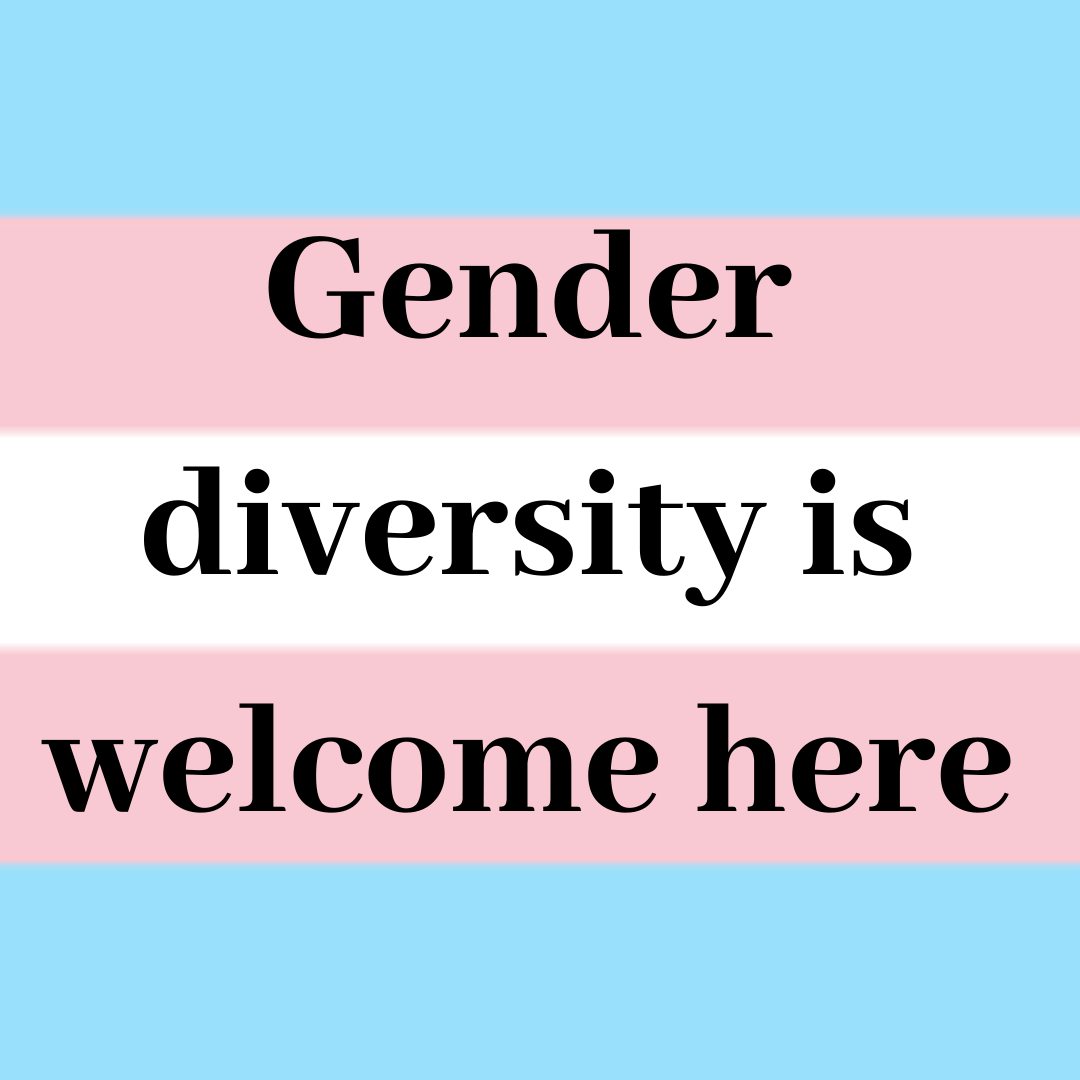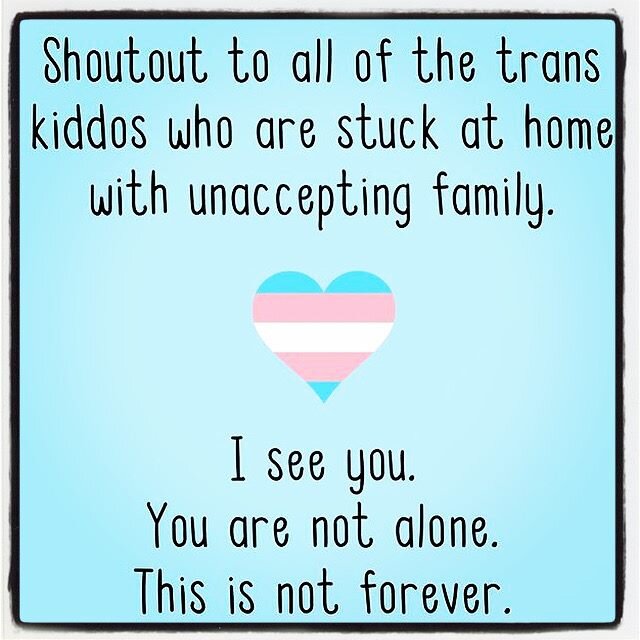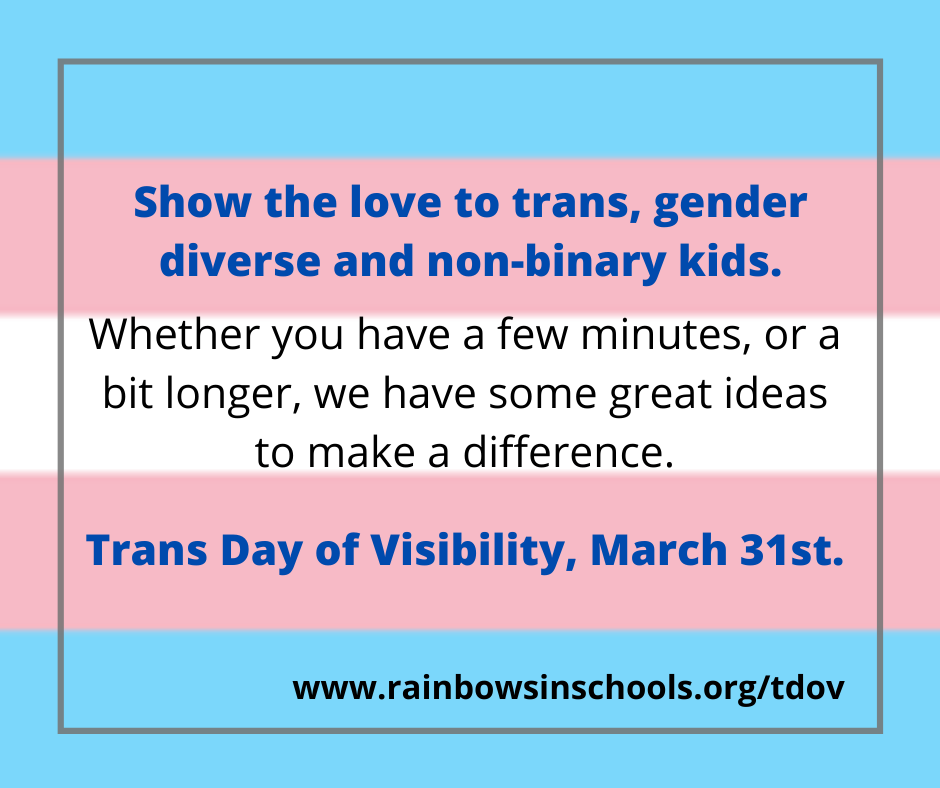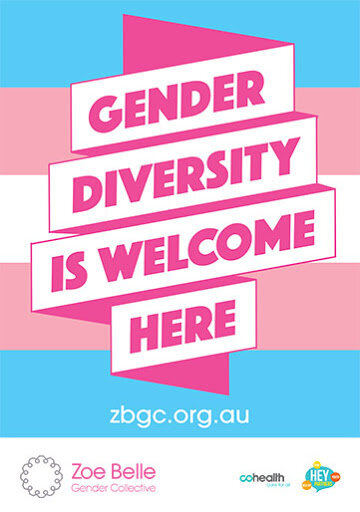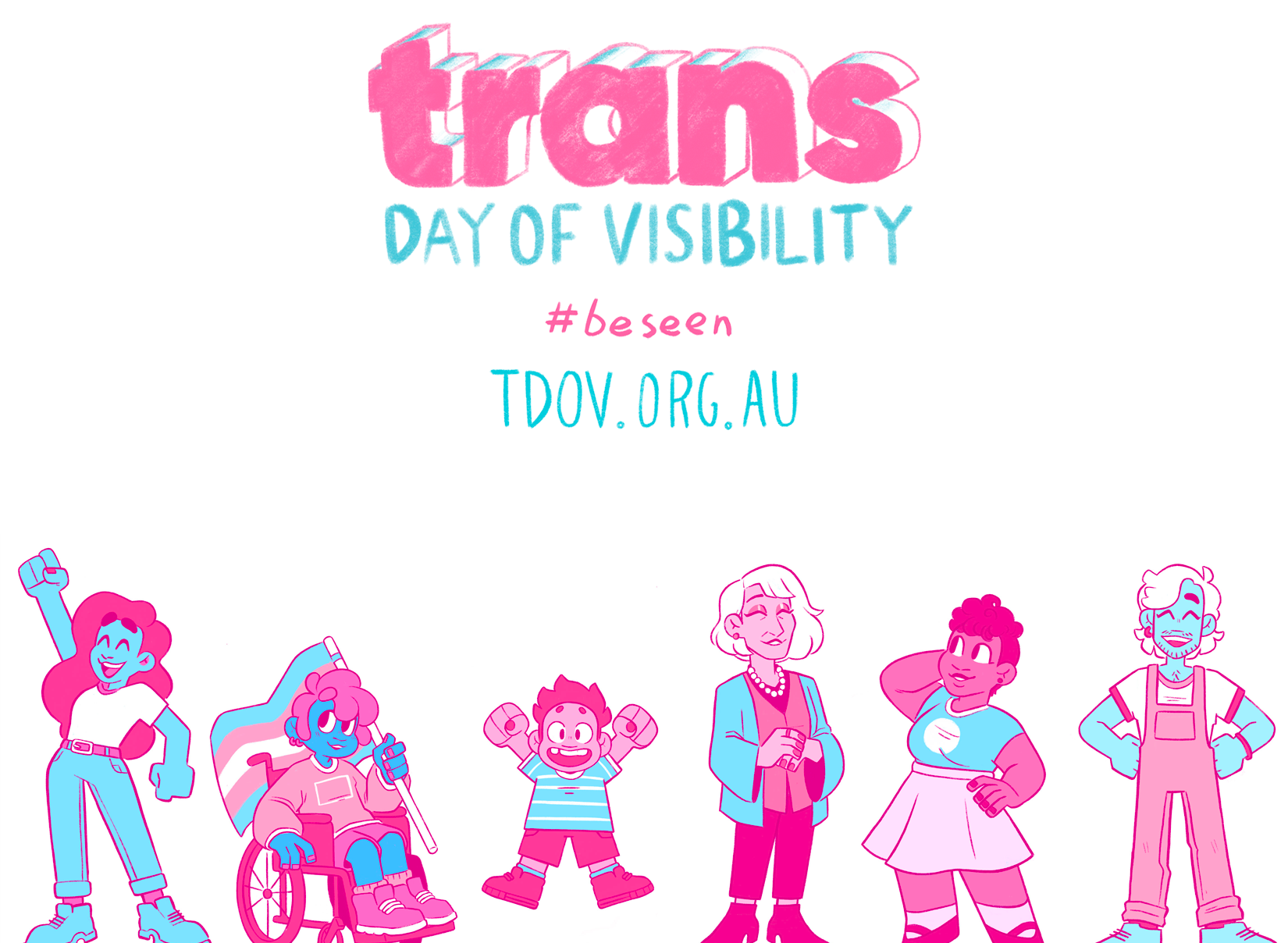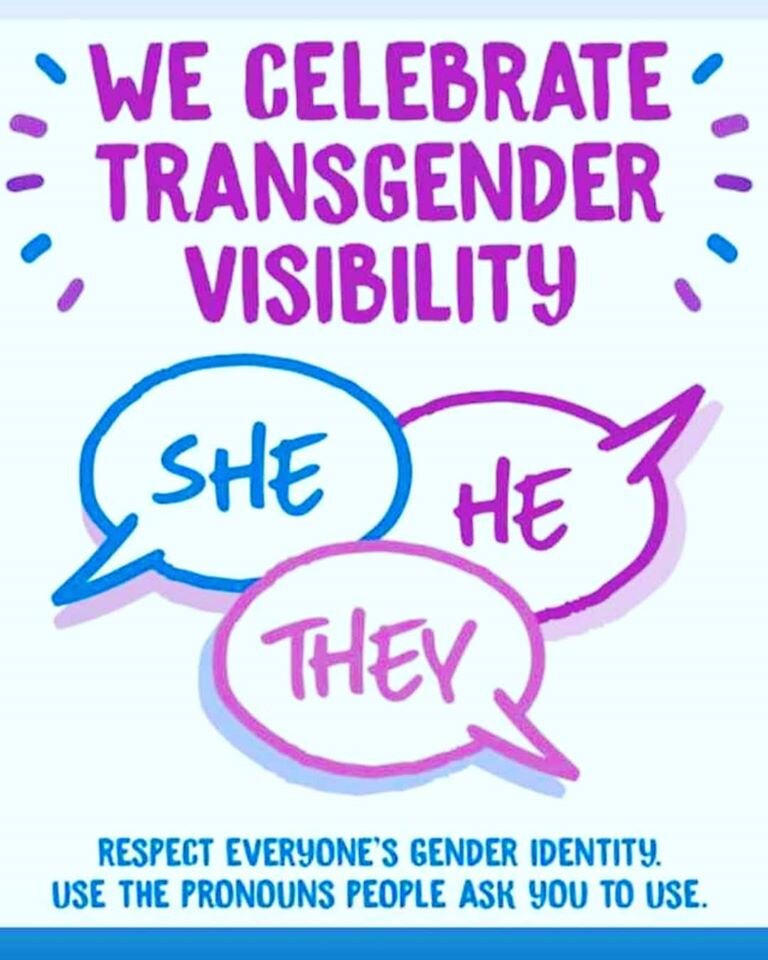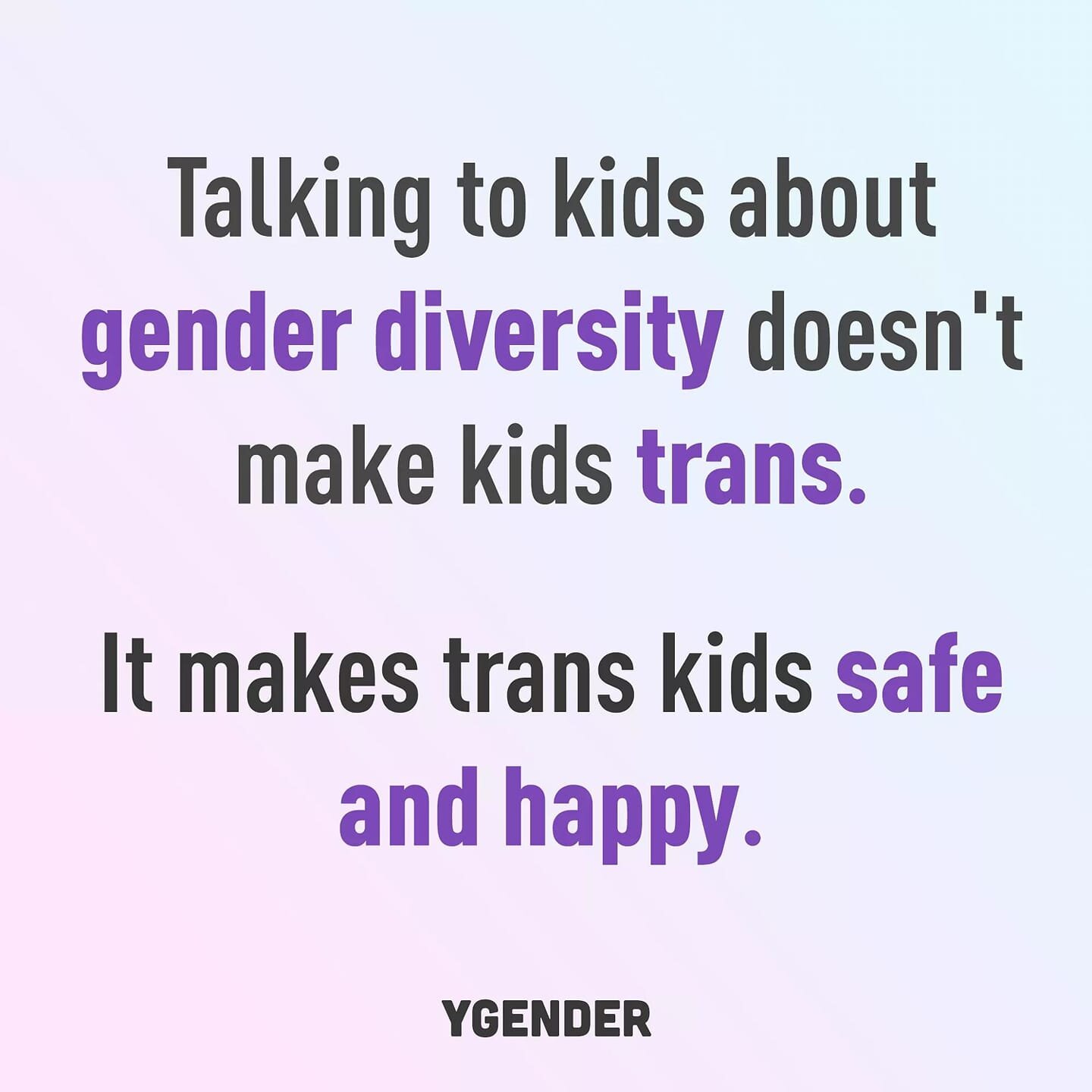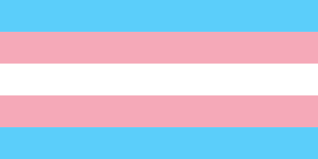Let’s show our support for gender diversity around
Trans Day of Visibility (TDOV), Mar 31st.
Usually TDOV is a day of celebration and mass gatherings, which we can’t do in 2020 because of covid-19. So instead, here are some some quick ways we can show our support while we are all stuck at home.
Got time to do some reading?
learn more - talk to your kids - Talk to your school
While we are stuck at home, many of us are looking for meaningful activities so we can keep contributing to making the world a kinder, safer place. Which makes this a fantastic opportunity to do some learning and then to engage in activities that encourage ourselves, our kids, our schools and our communities, to become more supportive of trans and gender diverse people. Gotta be some good from all of this awfulness, right?
Need support?
Things to share on social media.
Spreading content on social media is one of the quickest ways and most powerful ways we have to help trans, gender diverse and non-binary kids. We’ve curated this content for you already, so if you don’t have much time, just post!
First Day tv series. Share this article on social media about First Day (rated PG), a new ABC Kids drama, starting on March 30th, about a transgender schoolgirl, played by trans actor and activist, Evie McDonald. This tv show will introduce wide audience to the issues faced by trans students. In under 5 minutes, you can share it on your wall, in your school’s social media groups, and any other places parents will see it. Why not email the link to your child’s teacher or the principal? This will have a massive impact. If you’re also a teacher, then consider sharing where other teachers will see it.
Change your profile frame - There is a great selection of trans related profile frames for social media. Choose one, and show your support every time you post.
Click on the images below to share.
Posters to print and display.
Have you head of the bear hunt happening around the world? People are putting teddy bears in front gardens and windows, to give kids something to look at while walking the dog in these isolated times.
Well what if we made a trans flag hunt for the isolated TGDNB kids out there?
Got access to a printer? Why not print off one of these amazing posters, and put it a window that can be seen from the street? Or if you’re really keen, do loads of them! (Assuming you will only have A4 printer, we have chosen simple posters with clear graphics.)
Click on any of the images below for the printable files, or any of the images above.
Wear your badges, lanyards and colours.
We may not be in our regular routines, in offices or schools, but we are still leaving the house for essential activities, and doing video conferencing. So let’s put on our badges, wear our trans lanyards, or even use eyeshadow for the blue, pink and white stripes. Don’t have any of the above? How about dressing in blue, pink and white?
And how about grabbing some trans merch from Minus 18, so that you are all stocked up for Trans Awareness Week in November.
Got time to learn more?
learn more - Spread the knowledge - talk to your kids - Talk to your school
Stuck at home in lockdown has got many of us looking for activities to not only fill our time, but also our sense of meaning, and contributing to making the world a kinder, safer place. Which makes this a fantastic opportunity to do some learning and then to engage in activities that encourage ourselves, our kids, our schools and our communities, to become more supportive of trans and gender diverse people. Gotta be some good from all of this awfulness, right?
And if something you read here moves you, why not send it on to your friends, so that we can spread the awareness of the importance of supporting TGDNB kids.
What it means to be trans, gender-diverse or non-binary.
video with Katie Couric (2 mins)- this is a great quick explanation of the Genderbread Person, and the differences between gender identity, gender expression, assigned gender and sexual orientation.
Life as a Non-Binary Teenager (5 mins) - ABC video about Audrey, non-binary teen.
What are Pronouns? (5 mins) - this quick video from Minus18 explains why pronouns are so important to trans and gender diverse and non-binary young people.
Raising My Rainbow - is an amazing Facebook page, blog and book, written by Lori Duron, the mother of gender creative tween, CJ. (CJ is cisgender, identifying as the gender he was assigned at birth, but he loves non-traditional “male” things, like clothing.) If you are wondering what school is like for a gender creative kid, check out these blog posts from Raising My Rainbow:
You Can’t Ask That: Transgender (27 mins) - is an entertaining refresher, from the ABC.
Trans 101 - from Minus18, is a great collection of videos covering all things trans, gender diverse and non-binary (video selections).
About a Girl (29 mins) - is an episode of Australian Story (ABC), about Georgie Stone, an Australian trans teenager and activist, who has lobbied with her family for law reform around the rights of transgender young people.
Genderbread.org - this website is great for a deep dive into a full explanation of the Genderbread Person.
Books to help adults understand - Welcoming Schools, a program of the Human Rights Campaign in the US, has this great list of books for adults, about the experiences of being trans, gender diverse and non-binary.
Wondering if your child might be trans, gender diverse or non-binary?
Transcend and Parents of Gender Diverse Children are two amazing community organisations with loads of information and support for parents of TGDNB kids.
How we can support TGDNB kids in schools.
This poster shows how important parental support is for trans and gender diverse young people.
Like all students, trans, gender diverse and non-binary students need to feel welcomed, seen and supported at school, in order to thrive.
(For some insight into what school can be like for kids who don’t express their gender as expected, check out Raising My Rainbow above.)
In Victoria, Australia, principals are directed by the Department of Education’s Gender Identity Policy, that “schools must support and respect a student's choice to identify as their desired gender”. They are then directed to work with students and parents/caregivers, to develop a plan that will consider issues such as: change of name and gender markers in school records, use of pronouns, uniform, toilets and changing room usage, sports team membership, and the student’s support needs. This often involves changes to school policies and procedures, and takes time and resources.
Which is why many schools do not begin these changes until they are asked to do so by a TGDNB student or their family. But it doesn’t have to be that way. The majority of the work involved can actually be done with the general needs of TGDNB students in mind, and then tweaked according to the wishes and needs of particular students.
Waiting for a student to ask for these accommodations puts a huge amount of stress on the student and their family, who are often put in the position of driving the change process and educating the school about TGDNB issues and necessary accommodations. Meanwhile the student is required to function everyday within a school that is not set up for their needs.
Waiting to be asked to make changes for TGDNB students also assumes that the first TGDNB student to ask for these changes is actually the first TGDNB student to attend the school.
Statistically, the chances of that are almost zero.
So we need to ask schools to start making these changes to policies and procedures as soon as possible, so that our schools are a safe and welcoming place for all students.
Asking schools to do more.
Set a reminder in your calendar for The end of April, to Let your school know that supporting tGDNB students is important to you.
First, you might like to read this bit…..(How can we support TGDNB kids at school?)
If this was 2019, or even a month ago, we would be writing to ask schools to put up posters and to teach from lesson plans about gender diversity and responding to bias-based bullying. But it’s March 2020, and schools are flat out dealing with enormous extra workloads, as they try to work out how to deliver our children’s education in previously unimagined scenarios.
So, we need them to keep doing that.
But at some point, there will be a ‘new normal’, and we will be able to think about things other than keeping safe in the time of coronavirus. At which point, we need them to ask them to make more accommodations for TDGNB students.
So, at the end of April, why not send the school a quick email letting them know that you want them to expand their support for trans, gender diverse and non-binary students. You can cut and paste from the sample letter that we have prepared, or write your own.
You could also let other parents know that you have done this, and encourage them to do it too, as the more parents request something, the more likely it is to happen.
Talking to our kids about gender diversity.
There are many amazing resources that can be used to start conversations with children and young people about gender diversity. Given it is a bit tricky to go out and buy a new book or video in March 2020, here are some resources you can access right now online. (For a wider selection of resources around talking to kids about gender and sexual diversity, go to our page Talking to Kids About LGBTQIA+.)
For pre-school and early primary kids
Be Who You Are - is one of an amazing series of books written by Todd Parr, about being yourself, being different to other kids, and different families. With libraries and many shops shutting at the moment, it is tricky to buy new books, so the above link is to a video of Todd reading the book himself. This handout from Welcoming Schools (a US initiative) gives some suggestions about talking to kids about the Todd’s book.
Queer Kid Stuff is a youtube channel made by a teacher, with some amazing short videos for kids, about “LGBTQ+ and social justice issues for all ages”. They have a number of short videos for pre-school - primary kids about being transgender, gender and gender expression.
Be Prepared for Questions and Put-Downs about Gender is a great tip sheet (from Welcoming Schools) with a range of simple statements that children and adults can use to respond to questions and negative comments about gender expression and gender stereotypes.
Older primary school kids might enjoy First Day, a new ABC Kids drama, starting on March 30th, about a transgender schoolgirl, played by trans actor and activist, Evie McDonald. First day centres around some of the issues faced by trans students in schools.
Books can be a brilliant way to bring up new ideas. The Rainbow Owl has great suggestions for books and resources on embracing and supporting trans and gender diverse young people, and they have thoughtfully separated their lists into books for different ages, and for schools and professionals.
Lesson Plans - If you are ahead of the curve, and are leaning in to remote schooling already, there are some great resources in the Australian curriculum that cover relevant topics.
The Resilience, Rights and Respectful Relationships (RRRR) teaching and learning materials cover gender and identity for each year level from Foundation (Prep) though to Yr 12. The above link allows you to download the full program for each year level, then scroll through to Topic 7 (Gender and Identity), where you will find 3-4 activity ideas for each year level. (RRRR are the teaching and learning materials of the Respectful Relationships initiative, from the Department of Education, Vic.)
Lesson Plans to Help Students Understand Gender and to Support Transgender and Non-Binary Children. These materials are from Welcoming Schools, a US program aimed at primary schools. The Welcoming Schools program is entirely online, and is an amazing wealth of resources, often referred to withing the RRRR materials.
Bias-Based Bullying - unfortunately, negative comments about TGDNB people (transphobia) is common, so it is important that parents, teachers and kids know how to respond to it.
Homophobic Behaviour webpage from the Victorian Department of Education has some great advice for parents and teachers about responding to unacceptable language and behaviour.
Responding to Some Concerns About Being LGBTQ Inclusive, is a Welcoming Schools resource that considers the bigger picture questions about school inclusivity.
Need support?
TGDNB supports
There are a huge number of amazing supports for trans, gender diverse and non-binary folks. Rainbow Network, an information hub about LGBTQIA+ services in Victoria, has a list of 42 services, when ‘trans’ is entered into their search engine. Here are some of the biggest. (All descriptions and details are from Rainbow Network list.)
Transgender Victoria
TGV is Victoria’s leading body for trans and gender diverse advocacy. We work to achieve justice, equity and inclusive service provision for trans and gender diverse people, their partners, families and friends. https://transgendervictoria.com/
Zoe Belle Gender Centre
Zoe Belle Gender Collective (ZBGC) is a trans and gender diverse led advocacy organisation based in Victoria. http://zbgc.org.au/
Transcend
Transcend provides parent/carer support, community connection, information, advocacy & fundraising. https://transcendsupport.com.au/
Parents of Gender Diverse Children
PGDC provides parent/carer support, community connection, information and advocacy. https://www.pgdc.org.au/
Y Gender
Ygender is a support and advocacy group for trans/gender diverse young people, run entirely by trans/gender diverse young people.
Switchboard
Switchboard Victoria provides a peer-driven support services for the lesbian, gay, bisexual,
transgender and gender divers, intersex, queer and asexual (LGBTIQA+) people, their families,
allies and communities
Minus 18
Minus18 is Australia's largest youth driven organisation for LGBTIQ youth. Minus18 provide incredible social events, dance parties and resources for LGBTIQ youth all over Australia.
General supports.
a 24 hour national telephone and online counselling service for young people aged between 5 and 25.
Ph 1800 55 1800 or visit www.kidshelpline.com.au.
provides confidential counselling, support and information for parents and carers of children from birth to 18 years old
available 8am to midnight, seven days a week including public holidays.
Ph 13 22 89 or visit https://www.education.vic.gov.au/parents/services-for-parents/Pages/parentline.aspx.
centres provide mental health support to 12 – 25 year old’s,
however website contains information, fact sheets and support for families/carers of all ages.
a free service for adults and children experiencing or who have experienced family violence, as well as families who need extra support with the care of children.
Ph. 1800 312 820
Monday to Friday 9am – 5pm.
provides emergency support for women (cisgender and transgender) and children experiencing or who have experienced family violence.
For support 24 hours, 7 days a week,
ph. 1800 015 188 or https://www.safesteps.org.au/.
support and resources for someone who provides unpaid care and support to family members and friends with a disability, mental illness, chronic health issue or age-related condition.
Free anonymous phone or online counselling for the LGBTIQ+ community as well as parents, carers and families seeking information and support.
Phone lines are open from 3pm to midnight, 7 nights per week,
Ph. 1800 184 527, or go to https://www.switchboard.org.au/ anytime.
Free online and telephone support and counselling to young people 12 - 25 and their families and friends.
